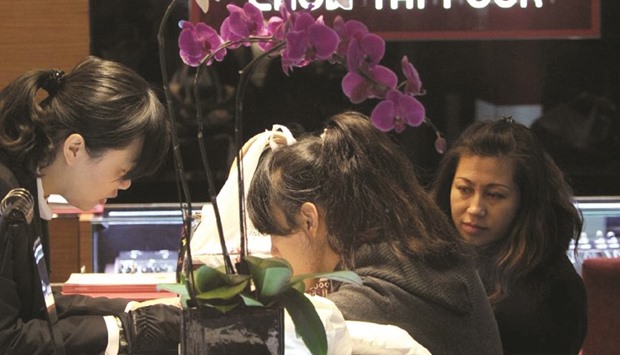The Chow Tai Fook brand took almost 90 years to become a family empire spanning Hong Kong shopping centres, the world’s largest jewellery chain and casinos to give patriarch Cheng Yu-tung a $10bn net worth. Alibaba Group Holding’s founder Jack Ma needed less than five years to amass an e-commerce fortune almost triple that.
Now, the Cheng family’s holding company is making a move to chase Alibaba and other Internet retailers by expanding its online presence. It invested 350mn yuan ($54mn) in shopping platform CTFHOKO.com in December and a mall to showcase products sold online. Its website offers genuine imports such as infant formula, diapers and cosmetics at prices at least 10% cheaper than shops in mainland China and is aimed at consumers wary of counterfeit goods online.
The company is banking on its decades-old reputation. While Hong Kong-based Chow Tai Fook has little e-commerce experience compared with JD.com Inc and Alibaba’s Tmall, it “can offer confidence in product quality while some existing websites may have fake products,” said Chan Sai-cheong, executive director of Chow Tai Fook’s jewellery unit in charge of the venture.
Cheng family’s flagship Chow Tai Fook Jewellery Group joins other retailers in stepping up its online business that has long been dominated by Alibaba and other e-commerce companies. It’s also seen its traditional business suffer its worst year since 2011 as China’s slowing economy and anti-graft campaigns curb demand for luxury goods. Shares of the company have dipped 4% this year, compared to the 7% drop in Hong Kong’s Hang Sang Index.
The prize is a $100bn-a-year online Chinese market for imports such as cookies and diapers, according to a report by Mintel Group, as consumers remain concerned about local products after a series of scandals over fake goods. China’s e- commerce industry is dominated by Alibaba and JD.com, with market shares of 52% and 20% respectively, according to the report.
“It’s unlikely for newcomers to compete for website visitation” because China’s most popular online platforms such as Alibaba attracts the most traffic, said Ray Zhao, an analyst at Guotai Junan Securities Co. “It has to cooperate with China’s Internet companies to let Chinese consumers know there is a new website.” The hurdle for Chow Tai Fook is not just homegrown.
Amazon.com, the world’s largest e-commerce company, is also putting together a plan to take on Alibaba as it vies to capture China’s growing cross-border e-commerce market, which by 2020 is expected to swell into a $1tn industry serving 900mn shoppers, according to a June report from Accenture and AliResearch, Alibaba’s research arm.
While other brick-and-mortar companies have paired up with established platforms to break into China’s online market, such as the partnership between LVMH-owned cosmetics retailer Sephora and JD.com as well as department store chain Intime Retail Group Co’s venture with Alibaba, Chow Tai Fook is prepared to go at it alone.
“We don’t need to have any partnership in expanding the business – we are strong enough to do it by ourselves,” Chan said in an interview in his Hong Kong office. “What we care is that the business model has potential to grow.”
To complement its online offerings, Chow Tai Fook built a companion shopping mall in the Qianhai free trade zone in the southern city of Shenzhen to exhibit products sold online, while some are also for sale at the stores.
Since the first phase of the three-story mall opened in December, Chow Tai Fook has invited 21 Hong Kong retail brands such as cosmetics retailer Sa International Holdings and Maxim’s Cakes to display their wares there and sell on its website. At least another 50 retailers will open outlets at the mall when its next phase is ready in May, said Chan. All products in the CTF HOKO mall and sold on its sister website are shipped from Hong Kong or other countries outside China, and prices for products such as cosmetics, milk powder and diapers are cheaper than at shops. That’s because the government has adopted lower taxes for online retailers that import through specific ports, under a program labeled “cross border e-commerce.” Chow Tai Fook isn’t the only traditional retailer to try and benefit from the programme. China Resources Holdings Co started ewj.com last July and opened a companion showroom in Shenzhen, while Wal-Mart Stores also plans to introduce a cross-border e-commerce service this year.
Imported products for infants have been the most popular category since Chow Tai Fook opened its platform, as “Chinese parents don’t stint on baby products,” said Chan. “They want to give their children everything that’s good quality, and they don’t trust domestic brands after some scandals.”
The company plans to open other showrooms across China to market its online offerings. It could draw more traffic with low-value goods before switching back to the luxury products for which Chow Tai Fook is known, said Bloomberg Intelligence analyst Catherine Lim. “New players can only succeed in surviving by focusing on some niche segments that existing players don’t focus on,” she said.

Chow Tai Fook Jewellery Group joins other retailers in stepping up its online business that has long been dominated by Alibaba and other e-commerce companies.
